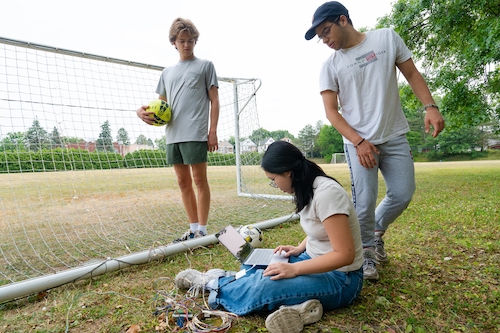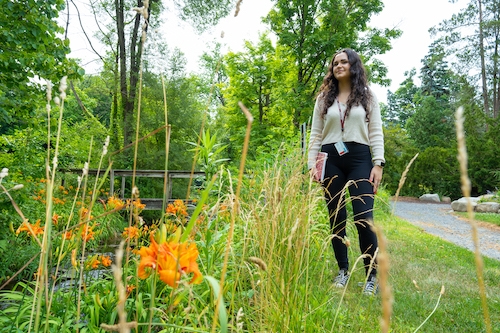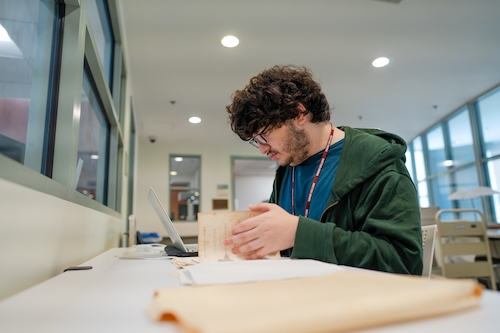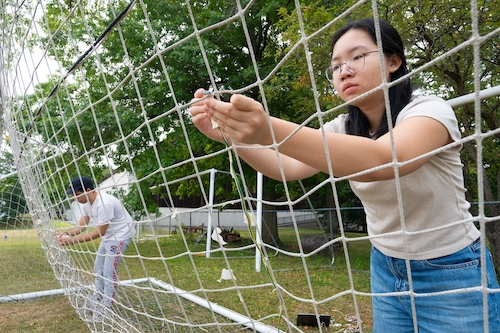On a hot, sticky morning, Zaid Fafouri ’26 and Austin Gregory ’25 took turns kicking soccer balls into a net at Garis Field. Over the course of two hours, they would repeat this routine hundreds of times.
Thud. Thud. Thud.
Crouched safely behind the net, Nguyen Ho ’26 collected data into her laptop from a series of sensors attached to the netting. Each shot generates 1,800 pieces of data. After the final kick, they will retreat to a lab to analyze the data.
Under the guidance of Michael Okwori, the Mary H. ’80 and Richard K. Templeton ’80 Assistant Professor in Union’s Electrical, Computer and Biomedical Engineering Department, the trio hopes to develop a smart soccer net system to help tell users where the ball went into the net based on the movement of the net.
“This will really be helpful for amateur soccer players,” said Fafouri, of Casablanca, Morocco.
The three electrical engineering majors are among 135 students across dozens of disciplines engaged in paid research this summer. Most projects are funded through the College’s undergraduate research program. Government or scientific society grants to faculty members, academic departments and foundation funding support the rest.
Since 1986, the College has fostered close working relationships between thousands of students and faculty in the summer as part of its longstanding commitment to undergraduate research.
“Our students work closely with faculty members in a way that simply isn't possible during term,” said Matthew Anderson, who assumed the role of director of undergraduate research July 1. He is also an assistant professor of computer science.
“These are intensive research apprenticeships - our students learn the intricacies of how research and scholarship are done from their expert mentor and put that learning into practice.”
During twice-weekly summer seminar series, student researchers will present their work in elevator pitches, hear about innovative research and scholarship conducted by Union faculty and participate in professional development activities led by the Office of Fellowships and Doctoral Pathways, the Writing Center and the Data Analytics Center.
A poster session highlighting many of the summer projects will held Friday, Aug. 2, from noon to 1:30 p.m. in the Wold Atrium.
Across campus and beyond, students are immersed in a diverse mix of projects. Clare Reilly ’26, a double major in art history and classics from Guilderland, N.Y., is one of two Evans Research Fellows in the College’s Special Collections and Archives.
Reilly is researching the role of women with Union’s historic Jackson’s Garden, the oldest garden on an American college campus. She is doing a deep dive on Marion Osgood Fox, the wife of Dixon Ryan Fox, the College president from 1934 to 1945.
Marion took over responsibility for the garden during her husband’s tenure as president.
An ardent gardener, “she did a lot to renovate the gardens and gathered a community of other faculty wives to help,” Reilly said.
Reilly enjoyed learning that part of Marion’s legacy included the discovery of the diaries of Isaac Jackson, Class of 1826 and professor of mathematics and natural philosophy. He started the garden in the 1830s.
“The diaries give us valuable insight into the history of the garden,” said Reilly. She is advised by Stacie Raucci, the Frank Bailey Professor of Classics and chair of the department. “They have really changed since Jackson first cleared the land. It took a lot of people over time to make the garden what it is today.”
Reilly plans to share her findings through a podcast she hopes to launch in the next few weeks. Reilly's summer project and podcasts were inspired by the Byron Nichols Fellowship for Faculty Development project on ancient Roman gardens and gardening spearheaded by Raucci and Angela Commito, senior lecturer in Classics. Next year, Reilly's findings will be used in an innovative new course that Raucci and Commito are developing with fellowship support.
The other Evans Fellow is Robert Levitt ’26, a history major from Dobbs Ferry, N.Y. He is conducting research about Eliphalet Nott, Union’s president for 62 years, the longest tenure of any American college president.
His summer research is an extension of his sophomore project, which mainly followed the aftermath of Nott's death in 1866, with a specific focus on the Board of Trustees.
Levitt is poring through the College’s extensive archives on Nott and other source material to get a full picture of the supremely gifted orator’s life.
“I’m committed to going to Union for four years, so it would be useful to know the history of the College,” Levitt said. His advisor is Kenneth Aslakson, associate professor of history.
Of Nott, Levitt said he was a “commanding figure who some say ruled with an iron fist. He was the arbiter of everything.”
Both Evans Fellows are assisted by Joseph Lueck, Special Collections outreach and reference archivist.
Daniel Singer ’25, is working with a team of a students in a chemistry lab in the Integrated Science and Engineering Complex. Their focus is on making copper complexes that have biological applications. Singer’s role focuses on the synthesis of the complexes.
“We have been making pyridine schiff bases ligands (the organic structure that is bound to the metal center) and are moving into making azoles, which are cyclic analogues of the previous ligands along with the addition of a heteroatom,” said Singer.
“These ligands, when coordinated to copper, are likely to have a significant biological effect but add increased complexity in their synthesis. We are working to develop highly efficient methodology for synthesizing these ligands. We are also looking into the stability of these ligands when coordinated to transition metals as we have seen evidence of unusual hydrolysis.”
Other lab students include Kennedy Alexis '24, Abigail Bowman '23, Alex Erickson ’25, Owen Smith '25 and Paige Tromblee '25. The lab is under the direction of Laurie Tyler, professor of chemistry, and Colleen Connelly, assistant professor of chemistry.
These are just a few examples of summer research at Union. Throughout the summer, the College will feature a number of projects. Check back at the news site to learn more.
“The summer research program is a time for our students to delve deeply into a research project, attempting to learn something that they don't know, perhaps, something that no one on Earth knows,” said Anderson.
“This kind of experience allows students to extend what they learned in their classes into the real world, build an invaluable portfolio of work and skills for future careers in the workforce or academia, and prepare them for a lifetime of learning.”



